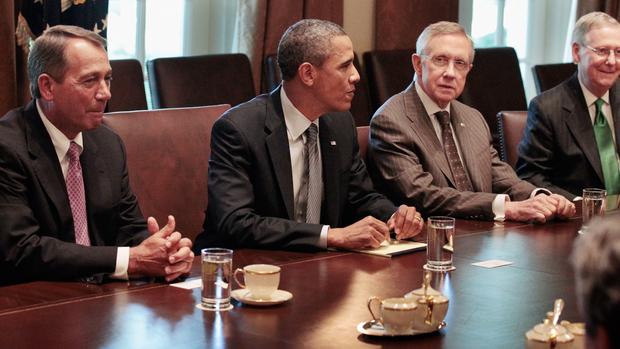John Boehner changes debt limit plan to secure Tea Party support
Updated 6:09 p.m. Eastern Time
The House Republican leadership appears to have found a way to get their members to vote in favor of their debt limit plan: By adding a Balanced Budget Amendment requirement that makes the bill even more toxic to Senate Democrats and the White House. Even before the change, Democrats had vowed to vote down the bill.
House Speaker John Boehner took to the Senate floor Friday afternoon shortly before the planned vote, saying he has "worked since the first week of this session... to avoid being where we are right this moment."
Boehner said he "stuck my neck out a mile to try to get an agreement with the President of the United States," but that "a lot of people in this town can never say yes." To cheers from his caucus, he called on Democrats and the White House to "tell you where you are."
"End this crisis now," he said.
Following a closed-door meeting of the House GOP Friday morning, Republican Reps. Jeff Flake of Arizona, Phil Gingrey of Georgia and Jeff Landry of Louisiana said they had gone from a "no" to a "yes" on Boehner's plan to increase the debt limit - and it appeared several other members had also come on board. The House leadership cancelled a planned vote on the bill last night after it became clear that they could not win enough votes from hardline fiscal conservatives for passage.
What changed? Members say the new version of the bill ties a second debt ceiling increase roughly six months from now to successfully sending a Balanced Budget Amendment to the states, something that would require a 2/3 majority in both the House and the Senate.
A vote on the new version of Boehner's plan will be held today around 6:30 p.m. Eastern Time - and the bill is expected to pass.
Republicans need 216 votes for passage, and can afford to lose 24 votes and still pass the measure without Democratic support.
The inclusion of the Balanced Budget Amendment prompted the Club for Growth, the influential fiscal conservative group, to remove its objection to the bill. In a statement Friday morning, Club for Growth President Chris Chocola said, "We strongly believe that a Balanced Budget Amendment is the piece of the puzzle that puts us on a path to fiscal responsibility and fundamentally reforms our broken budget process. If this new bill accomplishes that goal then the Club for Growth will withdraw its opposition to the Boehner plan and will not key vote against it."
In reality, however, there is no chance that a Balanced Budget Amendment will get the two-thirds majority necessary for passage in both chambers. (To go into effect, it would also need to be ratified by three-fourths of the states.) If Congress ends up passing some sort of compromise legislation between the Senate and House plans, the Balanced Budget Amendment will almost surely be stripped out.
Video: Debt debate furloughs FAA employees
Schieffer: We're behind Square One, in a hole
President Obama on Friday morning urged lawmakers to come to a bipartisan solutionto reach a deal to increase the nation's $14.3 trillion debt limit before Tuesday's deadline.
"The time for putting party first is over. The time for compromise on behalf of the American people is now," Mr. Obama said. "And I'm confident that we can solve this problem."
The addition of the Balanced Budget Amendment provision would actually move the House plan further to the right, however. But it appears to be the only way for Boehner and his leadership team to save face and pass a Republican version of a bill to raise the debt ceiling in the last days before the deadline is reached.
The Boehner plan is a two-step plan that would initially cut spending by more than $900 billion. It would only raise the debt limit enough to last until roughly January, setting up a replay of the debt limit fight just months from now. Democrats say the two-step plan is unacceptable because the short-term nature of the first step creates economic uncertainty and puts the United States' Triple-A credit rating at risk.
Mr. Obama dismissed the Republican plan Friday, saying it "has no chance of becoming law." He urged lawmakers to take up a plan from Senate Majority Leader Harry Reid or a plan put forward earlier by Senate Republican leader Mitch McConnell as the basis for a bipartisan agreement.
Reid said Friday morning that there will be movement forward on his plan, which would cut around $2 trillion in spending and extend the nation's borrowing authority through 2012, by the end of the day.
"This is likely our last chance to save this nation from default," Reid said. "The question is - will today's Republicans break away from the shrill voice of the Tea Party and return to the Republican Party of Ronald Reagan."
Reid's plan makes similar cuts to the first step of the Boehner plan, but it also includes about $1 trillion in savings tied to ending the wars in Iraq and Afghanistan -- something the United States is already planning to do. Republicans say the Reid plan is grounded in accounting tricks and doesn't do enough to address the nation's massive deficit and debt problem.
Mr. Obama warned Friday morning that if an agreement isn't reached, the U.S. may lose its Triple-A credit rating "not because we didn't have the capacity to pay our bills -- we do. But because we didn't have a triple-A political system to match our triple-A credit rating."
If the United States' credit rating were downgraded, it would be harder to borrow money, and interest rates would potentially increase across the board. "That's inexcusable," Mr. Obama said. "there are a lot of crises in the world we can't always predict or avoid... This isn't one of those crises."
CBSNews.com special report: America's debt battle


